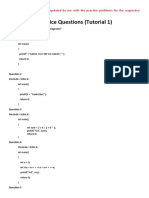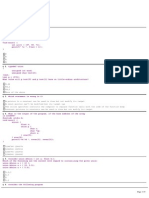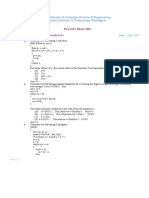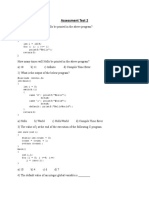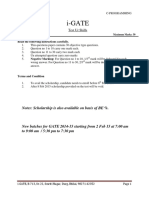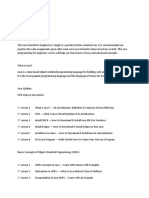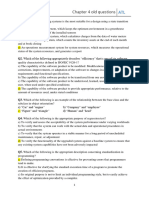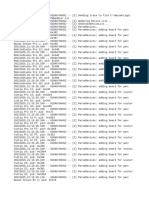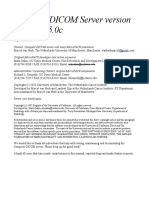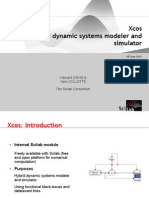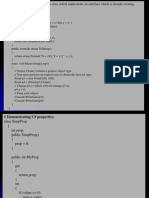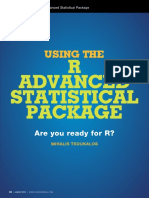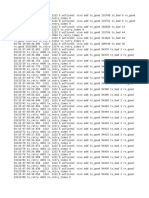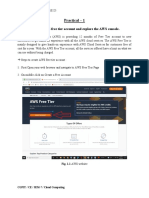Introduction to Programming in C
Sample Questions (Duration of the paper and the number of questions per section
may be different)
Section1: Each question carries one mark.
1. The output of the following code is ____________
#include <stdio.h>
int main()
{
int c=1;
switch( c ){
case 1:
printf(“1”);
default:
printf(“0”);
}
return 0;
}
Answer: 10
�2. The output of the following code is _____________________
#include <stdio.h>
int main()
{
int i=0;
for(i=0; i<10; i++){
if(i==2){
continue;
}
printf(“%d,”, i);
}
return 0;
}
Answer: 0,1,3,4,5,6,7,8,9,
�3. The output of the following code is ____________________________
#include <stdio.h>
int main()
{
int i=2;
do{
i--;
printf(“%d,”, i);
}while(i>0);
return 0;
}
Answer: 1,0,
�4. In C, static variables are initialized only once during the execution of a program, and the
values are not destroyed until the program terminates. With this in mind, the output of the
following code is ___________
#include <stdio.h>
int foo()
{
static int a=0;
a++;
return a;
}
int main()
{
printf(“%d,”, foo());
printf(“%d,”, foo());
return 0;
}
Answer: 1,2,
� Section 2: Each question carries two marks
5. The output of the following code on input 1 3 -1 is _______________________.
#include <stdio.h>
int main()
{
int i, count = 0;
scanf(“%d”, &i);
while (i != -1){
count ++;
scanf(“%d”,&i);
}
printf(“%d”, count);
return 0;
}
Answer: 2
�6. The output of the following code on input -1 -1 is _________________________.
#include <stdio.h>
int main()
{
int i, count = 0;
scanf(“%d”, &i);
do{
count ++;
scanf(“%d”,&i);
}while( i != -1);
printf(“%d”, count);
return 0;
}
Answer: 1
� 7. The output of the following code is _________________________.
#include <stdio.h>
void foo(int);
void bar(int);
void foo(int a)
{
if(a==0){
return;
}
printf("%d,", a);
bar(a-1);
return;
}
void bar(int a)
{
if(a==0){
return;
}
printf("%d,", a);
foo(a/2);
return;
}
int main()
{
foo(10);
return 0;
}
Answer: 10,9,4,3,1,
�8. The following code allocates a variable sized array, reads the array from the input and prints
the array. Fill the expression in the blank which forms valid C code below:
________________________
#include <stdio.h>
#include <stdlib.h>
int count;
void print_array(int a[])
{
int i;
for(i=0;i<_____; i++){
printf(“%d ”, a[i]);
}
return;
}
int main()
{
int *a;
int n;
int i=0;
scanf(“%d”,&n);
count=n;
a = (int *)malloc(n*sizeof(int));
for(i=0;i<n;i++){
scanf(“%d”,&a[i]);
}
print_array(a);
return 0;
}
Answer: count
�Section 3: All questions carry 3 marks each
9. The output of the following code is____________________
#include <stdio.h>
int main()
{
int i,j=0,k;
printf("%d,",3>5-2);
k = i=2,j;
printf("%d",k);
}
Answer: 0,2,
�10. The following function returns the length of a string. Which of the following statements will
correctly implement the function?
ptrdiff_t _strlen(char *s)
{
char* i=s;
while(*s){
________________
}
return s-i;
}
A) *s++;
B) s++;
C) *s = s+1;
D) s = *s+1;
Answer: B
�11. A n inversion in an array a[] are two elements a[i] and a[j] such that i<j but a[i]>a[j]. The
following code prints all the inversions in the array in the ordered pair form (a[i], a[j]) where
i<j, and counts the number of inversions in an array. Which of the following completes the
code?
int inversion_count(int *a, int n)
{
int i;
int j;
int count;
for(_______;i<n;i++){
for(______;j<n;j++){
if(a[i]>a[j]){
printf("(%d,%d)\n",a[i],a[j]);
count++;
}
}
}
return count;
}
A) i=0 in the outer loop, and j=0 in the inner loop
B) i=0 in the outer loop and j=1 in the inner loop
C) i=0, count=0 in the outer loop and j=i+1 in the inner loop
D) i=0 in the outer loop and j=i, count=0 in the inner loop
Answer: C
�12. The following code tries to swap the contents of the integers pointed to by ptra and ptrb.
The output of the following code is ________________
#include <stdio.h>
void swap(int *ptra, int *ptrb)
{
int *ptrtemp;
ptrtemp = ptra;
ptra = ptrb;
ptrb = ptrtemp;
return;
}
int main()
{
int a=1,b=2;
swap(&a,&b);
printf("%d,%d,", a,b);
return 0;
}
Answer: 1,2,


